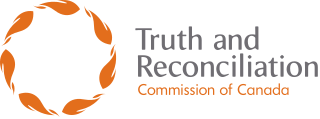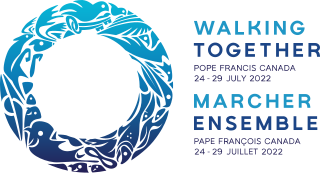Related Research Articles

The CanadianIndian residential school system was a network of boarding schools for Indigenous peoples. The network was funded by the Canadian government's Department of Indian Affairs and administered by Christian churches. The school system was created to isolate Indigenous children from the influence of their own culture and religion in order to assimilate them into the dominant Canadian culture. Over the course of the system's more than hundred-year existence, around 150,000 children were placed in residential schools nationally. By the 1930s, about 30 percent of Indigenous children were attending residential schools. The number of school-related deaths remains unknown due to incomplete records. Estimates range from 3,200 to over 30,000, mostly from disease.
Tkʼemlúps te Secwépemc, abbreviated TteS and previously known as the Kamloops Indian Band, is a First Nations government within the Shuswap Nation Tribal Council, which represents ten of the seventeen Secwepemc band governments, all in the southern Central Interior region, spanning the Thompson and Shuswap districts. It is one of the largest of the 17 groups into which the Secwepemc (Shuswap) nation was divided when the Colony of British Columbia established an Indian reserve system in the 1860s.

J. Wilton Littlechild, known as Willie Littlechild, is a Canadian lawyer and Cree chief who was Grand Chief of the Confederacy of Treaty Six First Nations and a member of Parliament. A residential school survivor, he is known for his work nationally and internationally on Indigenous rights. He was born in Hobbema, now named Maskwacis, Alberta.

The Secwépemc, known in English as the Shuswap people, are a First Nations people residing in the interior of the Canadian province of British Columbia. They speak one of the Salishan languages, known as Secwepemc or Shuswap.

The Kamloops Indian Residential School was part of the Canadian Indian residential school system. Located in Kamloops, British Columbia, it was once the largest residential school in Canada, with its enrolment peaking at 500 in the 1950s. The school was established in 1890 and operated until 1969, when it was taken over from the Catholic Church by the federal government to be used as a day school residence. It closed in 1978. The school building still stands today, and is located on the Tk’emlúps te Secwépemc First Nation.
The Esk'etemc are a First Nations people in the Cariboo Regional District of the Canadian province of British Columbia. They are a subgroup of the Secwepemc people and reside around the community of Alkali Lake, an unincorporated settlement and Indian Reserve community on the Cariboo Plateau south of the city of Williams Lake.

The Truth and Reconciliation Commission of Canada was a truth and reconciliation commission active in Canada from 2008 to 2015, organized by the parties of the Indian Residential Schools Settlement Agreement.
The First Nations nutrition experiments were a series of experiments run in Canada by Department of Pensions and National Health in the 1940s and 1950s. The experiments were conducted on at least 1,300 Indigenous people across Canada, approximately 1,000 of whom were children. The deaths connected with the experiments have been described as part of Canada's genocide of Indigenous peoples.

The National Day for Truth and Reconciliation, originally and still colloquially known as Orange Shirt Day, is a Canadian holiday to recognize the legacy of the Canadian Indian residential school system.

The National Centre for Truth and Reconciliation is the archival repository for all of the material collected by the Truth and Reconciliation Commission of Canada, purposed to compile the complete history and legacy of Canada's residential school system.

Marianne Boelscher Ignace is a Canadian linguist and anthropologist. Married into the Shuswap people, she is a Full professor in the departments of Linguistics and Indigenous Studies at Simon Fraser University (SFU), and Director of SFU's Indigenous Languages Program and First Nations Language Centre. In 2020, Ignace was elected a Fellow of the Royal Society of Canada for her work in revitalizing and preserving indigenous languages.

The Kuper Island Indian Residential School, also known as Kuper Island Indian Industrial School, was a Canadian Indian residential school located on Kuper Island, near Chemainus, British Columbia, that operated from 1889 to 1975. The school was operated by the Roman Catholic Church, with funding from the Department of Indian Affairs.
St. Joseph's Mission was a Roman Catholic mission established near Williams Lake, British Columbia in 1867. The mission was operated by the Missionary Oblates of Mary Immaculate. It is primarily known for the notorious St. Joseph's Indian Residential School located on the property, a part of the Canadian Indian residential school system that operated on the Mission from 1891 to 1981.

The Marieval Indian Residential School was part of the Canadian Indian residential school system. Located on the Cowessess 73 reserve in Marieval, Saskatchewan, it operated from 1898 to 1997. It was located in Qu'Appelle Valley, east of Crooked Lake and 24 km (15 mi) north of Broadview.
The Canadian Indian residential school system were a network of boarding schools for Indigenous peoples. Directed and funded by the Department of Indian Affairs, and administered mainly by Christian churches, the residential school system removed and isolated Indigenous children from the influence of their own native culture and religion in order to forcefully assimilate them into the dominant Canadian culture. Given that most of them were established by Christian missionaries with the express purpose of converting Indigenous children to Christianity, schools often had nearby mission churches with community cemeteries. Students were often buried in these cemeteries rather than being sent back to their home communities, since the school was expected by the Department of Indian Affairs to keep costs as low as possible. Additionally, occasional outbreaks of disease led to the creation of mass graves when the school had insufficient staff to bury students individually.
Morgan Asoyuf is a Ts'msyen artist from Prince Rupert, British Columbia. She is Eagle Clan from the Lax Kw’alaams community. A multidisciplinary artist, Asoyuf works primarily in goldsmithing, jewelry, gem-setting, and engraving.
Returning Home is a Canadian documentary film, directed by Sean Stiller and released in 2021. The film is a portrait of Phyllis Webstad, an Indian residential school survivor who founded Orange Shirt Day, and depicts both her national speaking tour about the residential schools and the activism of her home Secwepemc community around the decline of the Pacific salmon.
Rosanne Casimir is the Kúkpi7 of the Tk’emlúps te Secwépemc. She is the third woman to serve as Kúkpi7. During her tenure, 200 targets of interest were discovered with ground-penetrating radar on the site of the former Kamloops Indian Residential School. Some researchers have speculated that the targets may possibly indicate unmarked child graves, but forensic investigation with excavation has not been done to confirm these claims.

Pope Francis visited Canada from July 24 to 29, 2022, with stops in the provinces of Alberta and Quebec and the territory of Nunavut. The trip mainly focused on apologizing for the Catholic Church's role in the Canadian Indian residential school system and on reconciliation with the country's Indigenous peoples. It was the first papal visit to Canada since 2002, when Pope John Paul II visited Toronto for World Youth Day.
References
- ↑ Larsen, Karin (June 9, 2021). "Better Business Bureau warns of scammers falsely claiming to support Indigenous causes". CBC. Retrieved June 18, 2021.
- ↑ "'Profit from other people's pain': Residential school survivors warn of stolen designs on orange shirts". CTV News Vancouver Island. 2021-06-16. Retrieved 2021-06-17.
- 1 2 "Phyllis (Jack) Webstad's story in her own words..." OrangeShirtDay.org. Archived from the original on September 25, 2020. Retrieved September 23, 2020.
- 1 2 3 "The Story of Orange Shirt Day". OrangeShirtDay.org. Archived from the original on September 25, 2020. Retrieved September 23, 2020.
- 1 2 "Orange Shirt Day: How a 6-year-old's 1st day at residential school inspired a movement". CBC News. Retrieved October 19, 2017.
- 1 2 3 "Orange Shirt Day". Indian Residential School History and Dialogue Centre. University of British Columbia. Archived from the original on September 22, 2020. Retrieved September 23, 2020.
- ↑ Sinclair, Murray; Littlechild, Wilton; Wilson, Marie (2015). "The Survivors Speak" (PDF). Truth and Reconciliation Commission. pp. 39–45. Archived from the original (PDF) on October 18, 2020. Retrieved September 23, 2020.
- ↑ "Residential school survivor whose orange shirt inspired a movement co-authors textbook". North Shore News. 30 September 2020. Retrieved 2021-06-17.
- ↑ "Phyllis Webstad reflects on inspiring Orange Shirt Day and starting a movement". CBC. September 25, 2020. Retrieved June 18, 2021.
- ↑ "Small Victoria publisher makes Orange Shirt Day picture books when no one else would". Quill and Quire. September 27, 2019.
- 1 2 Robertson, David (June 10, 2021). "48 books by Indigenous writers to read to understand residential schools". CBC. Retrieved June 18, 2021.
- ↑ Sinclair, Murray; Littlechild, Wilton; Wilson, Marie (2015). "The Survivors Speak" (PDF). Truth and Reconciliation Commission. pp. 39–45. Archived from the original (PDF) on October 18, 2020. Retrieved September 23, 2020.
- ↑ Bryden, Joan (3 June 2021). "Royal assent given to bill creating national day for truth and reconciliation". CTVNews. Retrieved 18 June 2021.
- ↑ "Reconciliation week: Orange Shirt Day arrives early at B.C. Legislature". CBC News. Retrieved October 20, 2017.
- ↑ "AVRSB marks Orange Shirt Day to support First Nations students". The Chronicle Herald. October 17, 2017. Retrieved October 20, 2017.
- ↑ Justin Bell, "EIFF Review: Returning Home". Edmonton Journal , October 1, 2021.
- ↑ Ellis, Danika (2021-06-04). "Picture Books To Teach Children About Residential Schools". BOOK RIOT. Retrieved 2021-06-17.
- ↑ "Online educational activities kick off Summer Solstice Indigenous Festival". ottawacitizen. Retrieved 2021-06-17.
- 1 2 haggert (2020-08-21). "Survivor: The story of Phyllis Webstad and Orange Shirt Day". Canadian Geographic. Retrieved 2021-06-18.